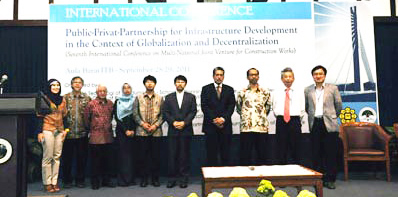Events
International Conference on Multi-National Joint Venture
for Construction Works
- Joint Venture for Infrastructure Development
in the Context of Globalization and Decentralization-
Date: September 28 - 29, 2011
Venue: West Hall, Institute of Technology Bandung, Indonesia
Organized by:
Institute of Technology Bandung; Dept of Urban Management, Graduate School of Engineering, Kyoto University; Graduate School of Management, Kyoto University, Kulliyyah of Architecture and Environmental Design, International Islamic University Malaysia
Supported by:
Global COE Program “Global Center for Education and Research on Human Security Engineering for Asian Megacities”; Center for Research in Business Administration, Graduate School of Management, Kyoto University
Number of attendants: Approximately 100
Report 178
Outline
Any single player can carry out neither construction projects nor infrastructure development. Joint venture in construction industry is an essential organizational vehicle contributing to economic outputs through the development of infrastructure and utilities. In most countries, joint venture in infrastructure development differs from other joint venture such as in industrial development. Infrastructure development in most countries is the responsibility of the public sector, while other sector such as industrial development is mostly associated with the private sector. Therefore, these 2 sectors would also have different joint venture implementations. Aside the differences in its implementations on various sectors, joint venture work are being done differently for each country, starting from its scheme, procurement, financing to its risk management. By understanding the different characteristics of joint venture work in each country, we are going to be able to learn from the experiences of other country and develop a better framework for joint venture work. Since the development of joint venture has been rapid and intersects with many other aspects, this conference would accept broader topic related to joint ventures.
Public Sector in this case, has a big responsibility to ensure the continuity of those investments. However, public sector in developing countries often faces issues in making investments, among them is the financial constraints and risk occurrence. Therefore, joint venture investment is seen as a solution for developing countries to improve or maintain its economic growth while also reducing public sector’s liability on the other side. As recently, decentralization has been playing an influential role in a country’s development, the interaction between joint venture work and decentralization on solving those issues would also be an interesting matter to be discussed.
Report
The conference attracted more than 100 attendants and 36 papers from Asian countries such as Indonesia, Malaysia, Vietnam, Thailand, Japan and Korea, including the keynote speech delivered by deputy Minister at Coordinating Ministry for Economic Affairs. One of the major topics addressed by the speakers is the role and implementation of public-private partnerships (PPPs) in developing countries. Attendants had a fruitful discussion on the implication of different political and economic background in each country on PPPs implementation through the country case studies. A key finding is that efficient and effective functioning of multi-national joint venture is increasingly getting important as players have to overcome various cultural differences in the globalized construction markets. The conference was concluded by stating that a conference next year will be held at National Hanbat University in Daejong, Korea in October to continue exploring the joint venture study.

